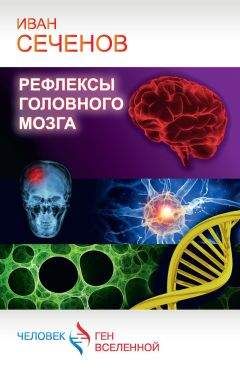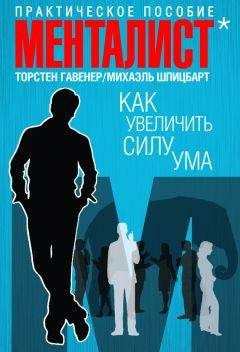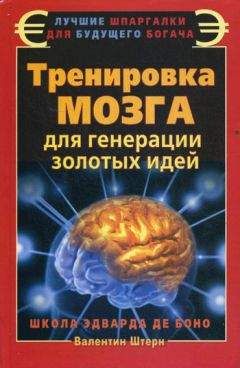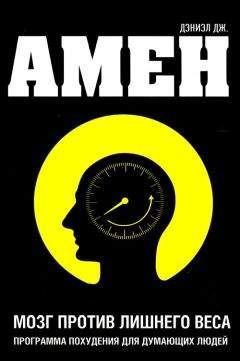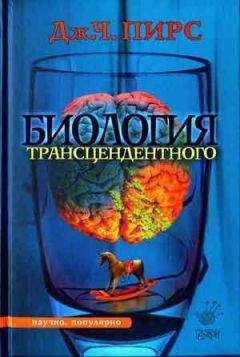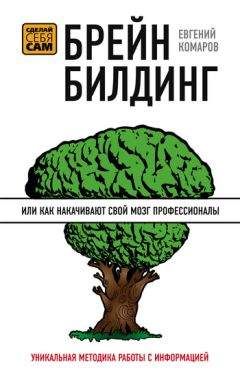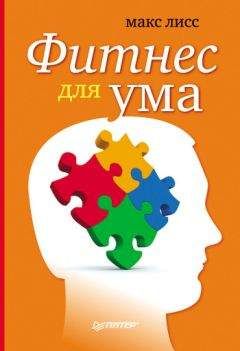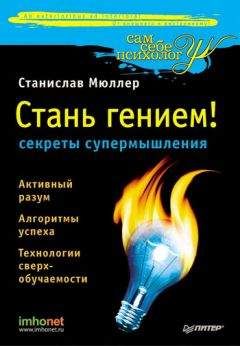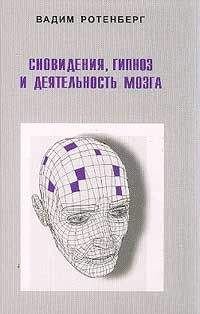Дэниел Амен - Измени мозг - изменится и тело
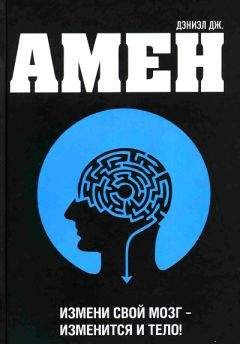
Скачивание начинается... Если скачивание не началось автоматически, пожалуйста нажмите на эту ссылку.
Жалоба
Напишите нам, и мы в срочном порядке примем меры.
Описание книги "Измени мозг - изменится и тело"
Описание и краткое содержание "Измени мозг - изменится и тело" читать бесплатно онлайн.
Дэниэл Амен, доктор медицины, нейробиолог, нейропсихиатр, эксперт по компьютерной томографии мозга, утверждает: здоровый мозг это ключ к улучшению внешнего и внутреннего состояния тела. Эта книга основана на последних научных исследованиях и двадцатилетием врачебном опыте автора в созданных им клиниках (Amen Clinics Inc.), где он со своими коллегами исследует работу мозга с помощью новейших технологий сканирования. В шестнадцати главах-советах содержится подробная практическая информация о том, как благодаря улучшению работы мозга добиться оптимального веса, сделать кожу более здоровой и красивой, выглядеть моложе, избавиться от вредных привычек, сократить уровень стресса, укрепить иммунитет, решить многие проблемы со здоровьем, улучшить сексуальную жизнь. Дается подробная информация о продуктах питания, витаминах и пищевых добавках, улучшающих работу мозга.
Независимо от того, находитесь ли вы в начале пути по созданию тела своей мечты или уже добились определенных результатов, — эта книга поможет вам перейти на новый уровень, потому что ваш мозг начнет работать на вас в полную силу.
Hahn, Y.B., Ro, Y.J., Song, H.H., Kim, N.C., Kim, H.S., Yoo, Y.S. 1993. The effect of thermal biofeedback and progressive muscle relaxation training in reducing blood pressure of patients with essential hypertension. Image — The Journal of Nursing Scholarship 25(3):204-7.
Haines, A.P., Imeson, J.D., Meade, T.W. 1987. Phobic anxiety and ischaemic heart disease. British Medical Journal 295:297–299.
Kawachi, I., Colditz, G.A., Ascherio, A., Rimm, E.B., Giovannucci, E., Stampfer, M.J., Willett, W.C. 1994. Prospective study of phobic anxiety and risk of coronary heart disease. Circulation 89:1992–1997.
Kawachi, I., Sparrow, D., Vokonas, P.S., Weiss, S.T. 1994. Symptoms of anxiety and risk of coronary heart disease: The Normative Aging Study. Circulation 90:2225–2229.
Kawachi, I., Sparrow, D. Vokonas, P.S., Weiss, S.T. 1995. Decreased heart rate variability in men with phobic anxiety. American Journal of Cardiology 75:882–885.
Kristal-Boneh, E. Raifel, M. Froom, P., Ribak, J. 1995. Heart rate variability in health and disease. Scandinavian Journal of Work, Environment & Health 21:85–95.
Lavi, T., Karasik, A., Koren-Morag, N., Kanety, H. Feinberg, M., Shecther, M. 2009. The acute effect of various glycemic index dietary carbohydrates on endothelial function in nondiabetic overweight and obese subjects. Journal of the American College of Cardiology 53:2283-2287
McCraty, R., Atkinson, M., Tiller, W., Rein, G. Watkins, A.D. 1995. The effects of emotions on short-term power spectrum analysis of heart rate variability. American Journal of Cardiology 76(14): 1089–1093.
Mendoza, I., et al. Sudden death: the anniversary effect. American College of Cardiology Meeting 2008; Abstract 1029-100.
Miller, M. Mangano, C., Park, Y., Goel, R., Plotnick, G.D., Vogel, R.A. 2006. Impact of cinematic viewing on endothelial function. Heart 92(2):261-2.
Mittleman, M.A., Maclure, M. Sherwood, J.B., Mulry, R.P., Tofler, G.H., Jacobs, S.C., Friedman, R., Benson, H. Muller, J.E. 1995. Triggering of acute myocardial infarction onset by episodes of anger. Circulation 92:1720–1725.
Neki, N.S., Singh, R.B., Rastogi, S.S. 2004. How brain influences neuro- cardiovascular dysfunction. Journal of Assocication of Physicians of India. 52:223-30.
Novoa, R., Hammonds, T., 2008. Clinical hypnosis for reduction of atrial fibrillation after coronary artery bypass graft surgery. Cleveland Clinic Journal of Medicine 75(Suppl 2):S44-7.
Offerhaus, R.E. 1980. Heart rate variability in psychiatry. In: RJ Kitney, Rompelman O (eds). The Study of Heart Rate Variability. Oxford: Oxford University Press, 225–238.
Sloan, R.P., Shapiro, P.A., Bigger, T. Jr., Bagiella, E., Steinman, R.C., Gorman, J.M. 1994. Cardiac autonomic control and hostility in healthy subjects. American Journal of Cardiology 74:298–300.
Souza, G.G., Mendoni;a-de-Souza A.C., Barros, E.M., Coutinho, E.F., Oliveira, L., Mendlowicz, M.V., Figueira, I., Volchan, E. 2007. Resilience and vagal tone predict cardiac recovery from acute social stress. Stress 10(4):368-74.
Task Force of the European Society of Cardiology and the North American Society of Pacing and Electrophysiology. 1996. Heart rate variability: standards of measurement, physiological interpretation and clinical use. Circulation 93:1043-65.
Wain, H.J., Amen, D.G., Oetgen, W.J. 1983. Cardiac arrhythmias and hypnotic intervention: advantages, disadvantages, precautions, and theoretical considerations. American Journal of Clinical Hypnosis 26(1):1–4.
Yeragani, V.K., Balon, R., Pohl, R. Ramesh, C., Glitz, D., Weinberg, P., Merlos, B. 1990.
Глава 9
2006 National Survey on Drug Use and Health, Office of Applied Studies. NSDUH Series H-32, DHHS Publication No. SMA 07-4293.
Dopheide, J.A., Pliszka, S.R. 2009. Attention-deficit-hyperactivity disorder: an update. Pharmacotherapy. 29(6):656-79.
Hambidge, K.M. Mild zinc deficiency in human subjects. In: Mills, C.F., ed. Zinc in Human Biology. New York: Springer-Verlag. 1989:281-96.
Heo et al. 2008. An open-label trial of Korean red ginseng as an adjuvant treatment for cognitive impairment in patients with Alzheimer’s disease. European Journal of Neurology 8:865-8.
Jang et al. 2008. Red ginseng for treating erectile dysfunction: a systematic review. British Journal of Clinical Pharmacology 4:444-50.
King, J.C., Cousins, R.J. Zinc. In: Shils, M.E., Shike, M. Ross, A.C., Caballero, B., Cousins, R.J., eds. Modern Nutrition in Health and Disease, 10th ed. Baltimore: Lippincott Williams & Wilkins, 2005:271-85.
Lee et al. 2008. Interactioin between warfarin and Panax ginseng in ischemic stroke patients. Journal of Alternative and Complementary Medicine 6:715-21.
Lee et al. 2008. Panax ginseng enhances cognitive performance in Alzheimer’s disease. Alzheimer Disease & Associated Disorders 3:222-6.
Liang et al. 2005. Panax notoginseng supplementation enhances physical performance during endurance exercise. Journal of Strength & Conditioning Research 1:108-14.
Reay et al. 2005. Single doses of Panax ginseng (GU5) reduce blood glucose levels and improve cognitive performance during sustained mental activity. Journal of Psychopharmacology 4:357-65.
Sotaniemi et al. 1995. Ginseng therapy in non-insulin-dependent diabetic patients. Diabetes Care 10:1373-5.
Vuksan et al. 2008 Korean red ginseng (Panax ginseng) improves glucose and insulin regulation in well-controlled, type 2 diabetes: results of a randomized, double-blind, placebo-controlled study of efficacy and safety. Nutrition, Metabolism & Cardiovascular Diseases 1:46–56.
Wesnes et al. 2000. The memory enhancing effects of a ginkgo biloba/ panax ginseng combination in healthy middle-aged volunteers. Psychopharmacology (Berl.) 4:353-61.
Xiang et al. 2008. A comparison of the ancient use of ginseng in traditional Chinese medicine with modern pharmacological experiments and clinical trials. Phytotherapy Research 7:851-8.
Yin et al. 2008. Traditional Chinese medicine in treatment of metabolic syndrome. Endocrine, Metabolic & Immune Disorders — Drug Targets 2:99-111.
Глава 10
Abramowitz, E.G., Barak, Y., Ben-Avi, I., Knobler, H.Y. 2008. Hypnotherapy in the treatment of chronic combat-related PTSD patients suffering from insomnia: a randomized, zolpidem-controlled clinical trial. International Journal of Clinical 8c Experimental Hypnosis 56(3):270-80.
Amen, D.G. Healing ADD. New York: Berkley Books, 2001.
American Academy of Sleep Medicine. Extra sleep improves athletes’ performance. ScienceDaily June 14, 2007.
Ancoli-Israel, S., Palmer, B.W., Cooke, J.R., Corey-Bloom, J., Fiorentino, L., Natarajan, L., Liu, L., Ayalon, L., He, F., Loredo, J.S. 2008. Cognitive effects of treating obstructive sleep apnea in alzheimer’s disease: a randomized controlled study. Journal of the American Geriatrics Society 56(11):2076-81.
Benca, RM. 2001. Consequences of insomnia and its therapies. Journal of Clinical Psychiatry 62:(suppl 10):27–32.
Better Sleep Council. 2007. Poor work affecting accuracy and attitude on the job.
Buysse, D., et al. 2008. Prevalence, course, and comorbidity of insomnia and depression in young adults. Sleep 31(4):473–480.
Cappuccio, F. Obesity in children and adults: sleep deprivation doubles risk. Presented at the 2006 International AC21 Research Festival.
Carpenter, S. 2001. Sleep deprivation may be undermining teen health. Monitor on Psychology Vol. 32 No. 9.
Chapman, D.P. Sleeping habits of parents. Presented at American Psychiatric Association’s 2007 annual meeting.
Danner, F., Phillips, B. 2008. Adolescent sleep, school start times, and teen motor vehicle crashes. Journal of Clinical Sleep Medicine 4(6):533-5.
Durmer, J.S., Dinges, D.F. 2005. Neurocognitive consequences of sleep deprivation. Seminars in Neurology 25:117–129.
Forquer, L.M., Camden, A.E., Gabriau, K.M., Johnson, C.M. 2008. Sleep patterns of college students at a public university. Journal of American College Health 56(5):563-5.
Giannotti, F. 2005. Sleeping habits in italian children and adolescents. Sleep and Biological Rhythms 3(1): 15–21.
Giannotti, F. Sleep problems and emotional disorders in children. Presented at SLEEP 2008, the 22nd Annual Meeting of the Associated Professional Sleep Societies.
Hvolby A., Jorgensen J., Bilenberg N. 2009. Parental rating of sleep in children with attention deficit/hyperactivity disorder. European Child & Adolescent Psychiatry 18(7):429-38.
Jin, Q. Shi, Q. 2008. A comparison of the number of hours of sleep in high school students who took advanced placement and/or college courses and those who did not. Journal of School Nursing 24(6):417-24.
Lamberg, L. 2005. Sleep may be athletes’ best performance booster. Psychiatric News 40(16):21.
Landrigan, C., et al. 2004. Effect of reducing interns’ work hours on serious medical errors in intensive care units. New England Journal of Medicine 351:1838–1848.
McCrae, C.S., Wilson, N.M., Lichstein, K.L., Durrence, H.H., Taylor, D.J., Riedel, B.W., Bush, A.J. 2008. Self-reported sleep, demographics, health, and daytime functioning in young old and old old community-dwelling seniors. Behavioral Sleep Medicine 6(2): 106-26.
National Institute of Neurological Disorders and Stroke. 2007. Brain basics: understanding sleep.
National Traffic Highway Safety Administration. Drowsy driving and automobile crashes: NCSDR/NHTSA expert panel on driver fatigue and sleepiness.
Neckelmann, D., Mykletun, A., Dahl, A. 2007. Chronic insomnia as a risk factor for developing anxiety and depression. Sleep 30(7):873–880.
Nedeltcheva, A., et al. 2009. Sleep curtailment is accompanied by increased intake of calories from snacks. American Journal of Clinical Nutrition 89(1):126–133.
Nedeltcheva A, et al. 2009. Exposure to recurrent sleep restriction in the setting of high caloric intake and physical inactivity results in increased insulin resistance and reduced glucose tolerance. Journal of Clinical Endocrinology & Metabolism published online June 30. DOI: 10.1210/ jc.2009–0483.
Owens J. 2008. Sleep disorders and attention-deficit/hyperactivity disorder. Current Psychiatry Reports 10(5):439-44.
Patel, S., Malhotra, A., White, David, Gottlieb, D., Hu, F. 2006. Association between reduced sleep and weight gain in women. American Journal of Epidemiology. 164(10):947–954.
Pigeon, W. et al. 2008. Is insomnia a perpetuating factor for late-life depression in the impact cohort? Sleep 31 (4):481–488.
Postuma, R., et al. 2009. Quantifying the risk of neurodegenerative disease in idiopathic rem sleep behavior disorder. Neurology 72(15):1296-300.
Rabat, M. Rejuvenate your skin while you sleep, Life Extension Magazine August 2003.
Roane, B., Taylor, D. 2008. Adolescent insomnia as a risk factor for early adult depression and substance abuse. Sleep 31(10):1351–1356.
Shinomiya, K., Inoue, T., Utsu, Y., Tokunaga, S., Masuoka, T., Ohmori, A., Kamei, C. 2005. Effects of kava-kava extract on the sleep-wake cycle in sleep-disturbed rats. Psychopharmacology (Berl) 180(3):564-9.
Spiegel, K., Tasali, E. Leproult, R., Van Cauter, E. 2009. Effects of poor and short sleep on glucose metabolism and obesity risk. Nature Reviews Endocrinology 5(5):253—61.
Stein, J. Athletes who sleep more may score more. Los Angeles Times June 18, 2007.
Stojanovski, S. et al. 2007. Trends in medication prescribing for pediatric sleep difficulties in us outpatient settings. Sleep 30(8):1013–1017.
Suh, D.H., et al. 2001. Effects of 12-O-tetradecanoyl-phorbol-13-acetate [corrected] and sodium lauryl sulfate on the production and expression of cytokines and proto-oncogenes in photoaged and intrinsically aged human keratinocytes. Journal of Investigative Dermatology 117(5): 1225—33.
Taber, K., Hurley, R. 2006. Functional neuroanatomy of sleep and sleep deprivation. Journal of Neuropsychiatry and Clinical Neurosciences 18:1–5.
Taheri, S., Lin, L., Austin, D. Young, T., Mignot, E. 2004. Short sleep duration is associated with reduced leptin, elevated ghrelin, and increased body mass index. PLoS Med l(3):e62.
Wain, H.J., Amen, D., Jabbari, B. 1990. The effects of hypnosis on a parkinsonian tremor: case report with polygraph/EEG recordings. American Journal of Clinical Hypnosis 33(2):94-8.
Wheatley, D. 2001. Stress-induced insomnia treated with kava and valerian: singly and in combination. Human Psychopharmacology 16(4):353–356.
Wheatley, D. 2005. Medicinal plants for insomnia: a review of their pharmacology, efficacy and tolerability. Journal of Psychopharmacology 19(4):414-21.
Yaggi, H., et al. 2005. Obstructive sleep apnea as a risk factor for stroke and death. The New England Journal of Medicine 19(353):2034–2041.
Глава 11
Amen, D.G. Change Your Brain, Change Your Life. New York: Three Rivers Press, 2000.
Amen, D.G. Magnificent Mind at Any Age. New York: Harmony Books, 2008.
Amen, D.G. Making a Good Brain Great. New York: Harmony Books, 2005.
Amen, D.G., Payne, J. Making a Good Brain Great High School Course, 2005.
Anderheim, L., Holter, H., Bergh, C., Moller, A. 2005. Does psychological stress affect the outcome of in vitro fertilization? Human Reproduction 20(10):2969-75.
Atsumi, T., Tonosaki, K. 2007. Smelling lavender and rosemary increases free radical scavenging activity and decreases cortisol level in saliva. Psychiatry Research 150(l):89–96.
Bellinger D.L., Lubahn, C., Lorton, D. 2008. Maternal and early life stress effects on immune function: relevance to immunotoxicology. Journal of Immunotoxicology 5 (4):419-44.
Bennett, M.P., Zeller, J.M., Rosenberg, L. McCann, J. 2003. The effect of mirthful laughter on stress and natural killer cell activity. Alternative Therapies in Health & Medicine 9(2):38–45.
Boivin, J., Schmidt, L. 2005. Infertility-related stress in men and women predicts treatment outcome 1 year later. Fertility and Sterility 83(6):1745-52.
Campagne, D.M. 2006. Should fertilization treatment start with reducing stress? Human Reproduction (7):1651—8.
Collodel, G., Moretti, E., Fontani, V., Rinaldi, S., Aravagli, L., Sarago, G., Capitani, S., Anichini, C. 2008. Effect of emotional stress on sperm quality. Indian Journal of Medical Research 128(3):254—61.
Doraiswamy, P.M., Xiong, G.L. 2007. Does meditation enhance cognition and brain longevity? Annals of the New York Academy of Sciences Sep 28. [Epub ahead of print].
Ebbesen, S.M., Zachariae, R., Mehlsen, M.Y., Thomsen, D., Hojgaard, A., Ottosen, L. Petersen, T. Ingerslev, H.J. 2009. Stressful life events are associated with a poor in-vitro fertilization (IVF) outcome: a prospective study. Human Reproduction 24(9):2173-82.
Field, T., Field, T. Cullen, C., Largie, S., Diego, M., Schanberg, S., Kuhn, C. 2008. Lavender bath oil reduces stress and crying and enhances sleep in very young infants. Early Human Development 84(6):399–401.
Fisher, G.J., Varani, J. Voorhees, J.J. 2008. Looking older: fibroblast collapse and therapeutic implications. Archives of Dermatology 144(5):666-72.
Подписывайтесь на наши страницы в социальных сетях.
Будьте в курсе последних книжных новинок, комментируйте, обсуждайте. Мы ждём Вас!
Похожие книги на "Измени мозг - изменится и тело"
Книги похожие на "Измени мозг - изменится и тело" читать онлайн или скачать бесплатно полные версии.
Мы рекомендуем Вам зарегистрироваться либо войти на сайт под своим именем.
Отзывы о "Дэниел Амен - Измени мозг - изменится и тело"
Отзывы читателей о книге "Измени мозг - изменится и тело", комментарии и мнения людей о произведении.






